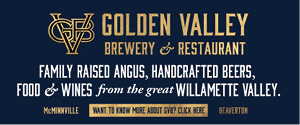Fare Share of Closures

By Mark Stock
It is fairly common to overhear the following conversation while dining at a new restaurant:
“This place is great, I just wonder if it will last.”
“Yeah, I’ve heard nine out of ten restaurants close in their first year.”
“What a brutal industry.”
Brutal as it may be in the current culinary climate, 90 percent is hyperbolic at best. Most restaurant associations and more neutral independent studies suggest that the first-year failure rate is more like 50 to 60 percent. Startling, yes, but a far cry from what seems to be the general belief.
Yet, given the context of an extremely unsettled economy, much gets compounded in this bizarre world of expected perfection, trend shifting and 16-hour workdays. Figure in the high caliber of food Oregonians have come to count on from their homegrown ingredients and chefs, and the failure rate begins to feel more like it’s rumored to be.
Last year was not the colossal comeback we hoped for, and many in the service industry couldn’t keep up. History says people will continue to eat and drink even when times are tough, but selectivity becomes king. The eateries and bottle shops that sank ranged from up-and-comers like Alu Wine Shop in Northeast Portland to city institutions like Greek restaurant and music venue Berbati’s Pan. In short, even places deemed sacred have been hit so hard they can’t get back up.
Ten-01 was one of those places. The chic Pearl District restaurant carried many of the ingredients for success: Prime location, a talented chef (at least for a spell) in Jack Yoss, and a respectable wine list (thanks to Erica Landon). But, even after weathering some critical press and revamping internally as well as in their menu, Ten 01 saw empty tables and rising costs. Owner Adam Berger has shut down the restaurant and will move some staff members, as well as what’s left of Ten-01’s 500-bottle cellar, to his other venture, the Mediterranean restaurant Tabla. Rest in peace, Ten-01 duck wings, you were tasty.
The Oregon wine industry is not quite as volatile, filling a certain niche and still riding a substantial wave of national interest, especially in the 2008 vintage. The New York Times’ Eric Asimov and Wine Spectator’s Harvey Steiman both wrote rave reviews, giving Oregon a big boost in hard economic times.
However, feeding that interest by way of bottle shops and urban tasting rooms is difficult. Here, in the absence of wide-reaching distributors and tourist-tempting vineyard settings, people must be extra creative. It doesn’t help that people do most of their wine shopping at the grocery store, where larger-production, lower-priced wines live in bulk.
“Sixty-seven percent of the Portland market buys their wine at the grocery store,” said Wine X-ing founder Eric Bean. “It’s all about convenience.”
His Wilsonville bottle shop closed Jan. 31, after five years of business. Bean admits it’s been a gradual change, and one — like so many things — involving monetary returns. During the past couple of years, his customers have strayed more from local and expensive to cheaper wines from Europe and South America. And while the grocery store will remain just down the road in February, shoppers will be “downgrading their choices.”
The list goes on. Northeast Portland wine bar Alu has shut down, siting the economy, location and its expensive concept as the culprits. Hollywood Wine & Espresso is done, as is Cork Northwest. Hillsdale’s quiet champion of northern Italian cuisine, Alba Osteria, served its last meal New Year’s Eve. Everett Street Bistro and Laurelwood Brewery’s Northwest chapter followed suit.
Most in the wine industry will admit that there’s still a lot of learning going on. As Eric Bean suggests, the contemporary concern is “finding our value in the overall market.” That is, determining what is actually possible with coveted local varietals that tend to be costly.
Trends have the staying power of loaded delivery trucks, but there’s a level of consistency coming out of Oregon wine country now and somehow that needs to be consistent with what people are willing to pay.
In the Willamette Valley, there’s almost too much of a good thing, with many small businesses fighting for their interpretation of the Northwest dining and drinking experience.
Soberingly, these soon-to-be abandoned or converted operations reflect a state with little expendable income and a trust in what’s easy, despite an underlying interest in what’s local and artisanal.
Mark Stock, a Gonzaga grad, is a Portland-based freelance writer and photographer with a knack for all things Oregon.












